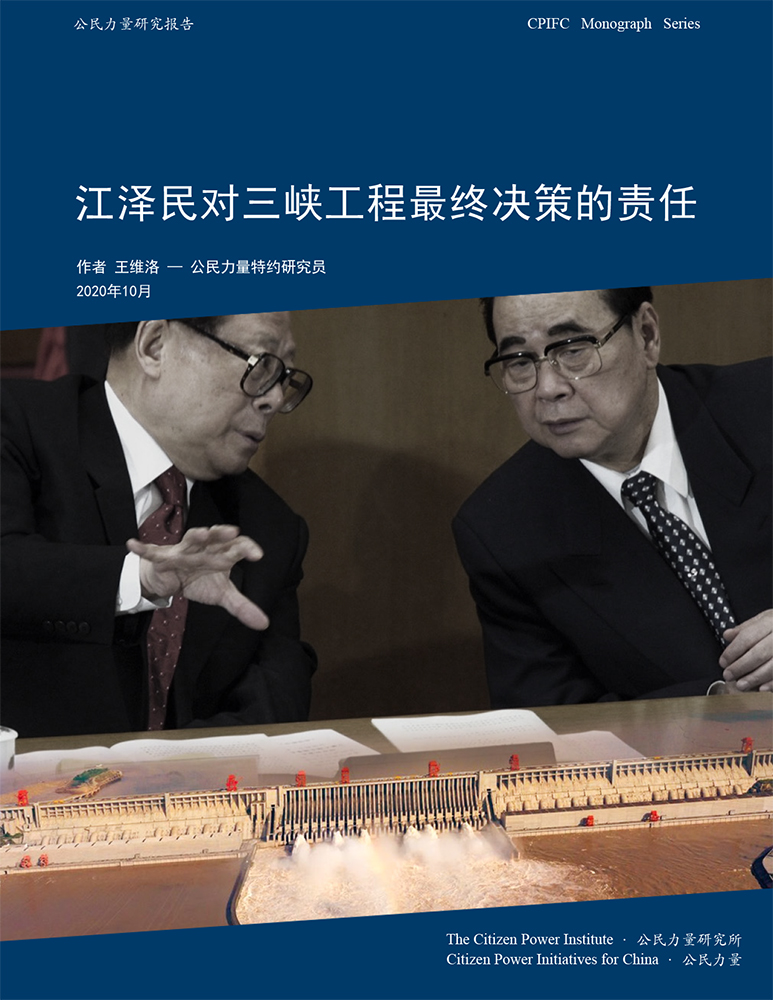Citizen Power Initiatives for China (CPIFC, 公民力量) released a monograph in Chinese Jiang Zemin’s Responsibilities on the Final Decision of the Three Gorges Project, The author of the Monograph is Dr. Wang Weiluo, a research fellow of Citizen Power Institute and an expert on Three Gorges Project. The monograph is published by Citizen Press, a branch of CPIFC.

The monograph, which is only available in Chinese language at this moment, is available at: https://drive.google.com/file/d/1z-UgAb2FUkDen-56dhrHccPjWFnj4lyB/view
【Abstract】
On January 17, 1992, Li Peng presided over the executive meeting of the State Council in which the Three Gorges Project was approved; on February 21 and 22, 1992, Jiang Zemin presided over the meeting of the Standing Committee of the Political Bureau of the CPC Central Committee in which the Three Gorges Project was approved; on April 3, 1992, Wan Li presided over the meeting of the National People’s Congress (NPC) in which the delegates voted to approve the bill submitted by the State Council on the Three Gorges Project. This decision formally established the Three Gorges Project.
The State Council, the Communist Party of China (CPC) Central Committee, and the NPC must be held accountable for the Three Gorges Project decision. In China, the CPC controls most aspects of society. Jiang Zemin, as the then General Secretary of the CPC Central Committee and the core of the third generation of CPC leaders, should be held accountable for the Three Gorges Project.
The Three Gorges Project was a political decision. Deng Xiaoping arranged for Zhao Ziyang to step down. Jiang Zemin then became the General Secretary, and Li Peng would be in charge of the Three Gorges Project. Jiang Zemin and Li Peng were the beneficiaries of this political deal, with Jiang Zemin benefiting the most.
The Three Gorges Project was the result of counter-elimination rule, which was typical for Jiang Zemin as the General Secretary of the CPC. He was recommended by several senior CPC officials, including Li Xiannian and Wang Zhen. Li and Wang advocated for the Three Gorges Dam to be developed having family financial interests in the project. Jiang Zemin knew this well. The Three Gorges Project was Jiang Zemin’s ruling tactic. Jiang’s position was unstable when he first arrived in Beijing. He needed the support of Li Peng, Li’s State Council faction, and the Soviet-background faction.
The Three Gorges Project was the embodiment of the Chinese political tradition that the emperors loved taming the floods. As floods have historically caused the loss of millions of lives in China, the ability to end this loss of life fulfills a Mandate of Heaven to whoever rules. The Qin Dynasty was well-known for its success in taming floods. Jiang Zemin inherited this historical political tradition as it met his personal aspirations and ambitions. Jiang intended to establish a historical monument for himself by following the example of Yu the Great, a legendary figure who tamed China’s Yellow river and in so doing, founded the Xia Dynasty. This monumental effort was the embodiment of Jiang Zemin’s value orientation: Stalinist mentality and Socialist superiority.
The Three Gorges Project was consistent with Jiang’s political strategy. Through major industrial and construction projects, cadres from central to local level could embezzle and accept bribes. This approach was Jiang ‘s strategy on winning over the cadres’ hearts, by allowing them to secretly make fortunes through graft and corruption. The cadres that supported him grew wealthy.
Jiang Zemin believed he would be exempted from decision-making responsibility within the project. He was under the impression that the feasibility studies on the Three Gorges Project had already been completed by over 400 scientists and been proposed to the central government to begin construction.
This being said, the scientists should also be held accountable for the construction of the Three Gorges Project.
Jiang Zemin admired personalities such as Zhang Guangdou and Wei Tingzheng who were known to be corrupt and deceptive. He disapproved of open debate, scientific and democratic discussion, and of scientists who advocated the truth such as Huang Wanli.
